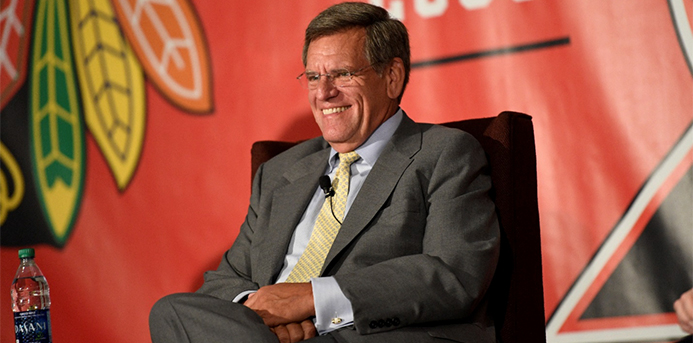In 2007, Rocky Wirtz took control of his family’s sports, entertainment, real estate, agriculture, insurance, banking, and liquor distribution empire — which includes the Chicago Blackhawks and a share of the United Center. Unfortunately, at that time, the team was Chicago’s laughing stock for its presence at the bottom of the NHL standings and poor attendance. Only three seasons later, in a stunning turnaround, the Blackhawks won the Stanley Cup, playing to standing-room-only crowds. This paralleled success in their other lines of business too.
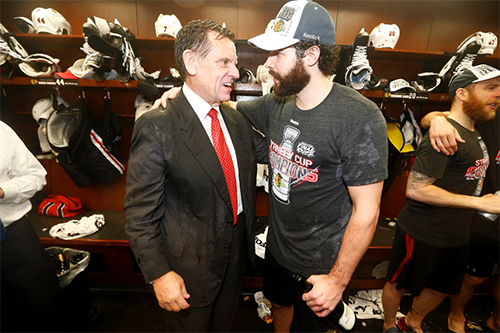
Ostensibly, the recently published book “The Breakaway” by award-winning journalist Bryan Smith is a story about the Blackhawks’ turnaround. In reality though, it’s Wirtz’s love story to the more than 40 relatives for whom he works (and the world) about their family legacy. (See photos from a recent book signing with Wirtz.)
Importantly, “The Breakaway” also provides inspiration for anyone struggling with difficult family or business dynamics. (And who couldn’t use this kind of help at one time or another?)
Wirtz’s grandfather, Arthur, founded the business almost a century ago, as a lucky in love and life, up-by-his-bootstraps entrepreneur. He started with Chicago real estate but expanded to also control 24 sports and entertainment arenas across the country (including Madison Square Garden), three of the original six NHL hockey teams, and extensive liquor distributorships. Known as “Barron of the Bottom Line,” at 6’ 4” and 343 pounds, and always impeccably dressed, Arthur ruled relentlessly — at work, at home, and everywhere else.
Arthur also decreed that control would pass down oldest son to oldest son — similar to royal succession.
Wirtz grew up knowing this. But the treatment he endured in the patriarchal family dynamics he negotiated tends to send people off the rails and deep into therapy, rather than further up the pinnacle of success. This included a 24/7 relentless focus on business by his male elders — grandfather, father Bill, and uncle Bruce. Worse yet, during his reign Bill turned downright mean and gave Wirtz’s brother, Peter, far greater visibility and power. Adding insult to injury, Wirtz suffered a long, acrimonious divorce that was splashed across newspaper front pages too.
Few individuals in such a position of power would allow such a candid book to be published. But, Wirtz actually facilitated it — spending eight months collaborating closely with the author.
Intrigued by these dynamics, hoping to gain insights that would help others too, I sat down to a wide-ranging interview with Wirtz in the dark walnut-paneled conference room still decorated as it was in his grandfather’s era.
References in “The Breakaway” imply that even as a child, Wirtz navigated human relationships well. So DNA helps. But clearly, he’s earned wisdom that should be shared widely too. This leads to my first question.
“How did you do this — navigate through so much family turmoil and launch great success so quickly?”
Wirtz nods his head slightly. “There’s a reason that family businesses usually crumble by the third or fourth generation,” Wirtz says. He shrugs and continues, “There just are a lot of trials and tribulations.”
Separate Church and State, Family and Business
“The biggest problem is separation of church and state. Family and business. We have clear boundaries separating family and business. I don’t bother them with work on weekends.
“That wasn’t the case with my father or grandfather. With them it was always work. They lived to work, 24/7.”
Wirtz describes growing up with a very different, more challenging relationship with his elders — never knowing how they were going to test him, when they were going to call. Late nights, early Saturday mornings, while he was engaged with other activities, they expected him to stop, drop, and answer.
Don’t Repeat Bad Behavior and Communicate Clearly — Especially With Family
“You don’t have to repeat bad behavior,” Wirtz continues. “Clear communication with people helps. In fact, you can’t over-communicate with family.”
Although Wirtz won’t bother family with work on weekends, he welcomes their calls 24/7 and keeps his cell phone constantly at his side. His son and two daughters all work in the business, but Wirtz isn’t referencing just them. He means the more than 40 family members who share ownership of the Wirtz empire.
It feels as though Wirtz would genuinely love to hear from any and all of his extended family more frequently too.
Listen, Relate, Evaluate, Formulate, Communicate, Empower
Clear communication seems to be an essential part of Wirtz’s general modus operandi. Think of it as Listen, Relate, Evaluate, Formulate, Communicate, Empower. He listens well to every question before giving thoughtful answers, both in life and business. He’s clearly an astute observer of people too, leading one to imagine he does this as a disciplined process with every line of business he controls.
This approach played an important role in Wirtz’s success at turning around the Blackhawks so quickly. He spent time deep in the back office, listening and observing what wasn’t working off the ice, as well as on. He quietly developed a vision for the team, put the right people and plan in place, and empowered them to execute.
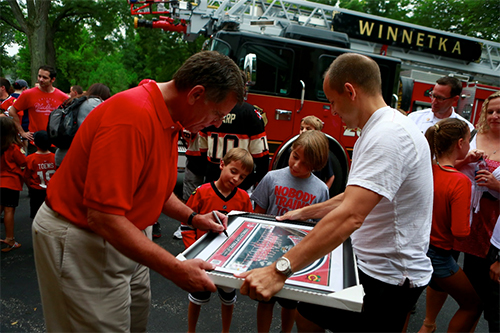
Leading in a Nonpatriarchal Era
So how does his family’s patriarchal heritage play out in this era? Interestingly, Wirtz’s great aunt was the first female NHL executive.
Wirtz ducks the question about whether the tradition of passing control to the eldest son will continue. “We’ll see,” he says.
But, Wirtz quickly points out how he differs from his forebears with respect to women in business generally. Simply put, his grandfather and father didn’t believe in having women in business. Period. Wirtz does.
“Women are playing key roles in our businesses at all levels.” He beams and proudly declares, “Both of my daughters — Hillary and Kendall — work for Breakthru Beverage Group and both are incredibly successful.”
The Blackhawks employ more women than ever too. “Our front office looks like our fan base, which is about 40 percent women and growing!”
He admits though that wholesale liquor distribution is still primarily run by white, middle-aged men, but acknowledges that this will change with the times too. This seems even more likely given his family employment preferences. Wirtz believes it’s better to employ his female relatives than their male spouses. It will be more natural to side with the blood relative if a dispute arises, he reasons.
As Vice Chairman of Breakthru Beverages, son Danny does look poised to succeed his father. Danny recently declared his father the person he most admires and “a shining example of how to run a business … with humility, acumen, ability to relate well to others, and by making good decisions,” in this recent Tribune video interview.
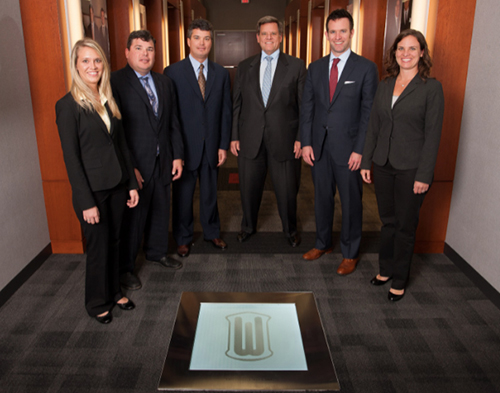
How else has business changed recently? I ask. Not surprisingly, Wirtz continues to focus on his children’s generation.
“Millennials and Generation Z are harder to reach. From my sports lens, they don’t follow sports teams as much as they follow our individual athletes. And we are seeing a shift in this direction with all our businesses, whether it be sports, entertainment, or wine and spirits. And it’s important to tell them stories to get them personally connected to the end product.
“Also, they want to know, how are you socially responsible? We have to get the culture right. Hiring is key; it’s more important than ever to understand the character of prospective employees.
“We set boundaries, clearly define what is expected, then give them all the support they want to accomplish our mutual goals.”
Here we go — another good example of Relate, Evaluate, Formulate, Communicate, Empower.
Many sports team owners report difficult relations with the press. Some even describe it as “doing battle.” Does Wirtz?
“I don’t see it as an adversarial relationship at all. You want to be able to talk to reporters, to tell your story too,” he explains. “But always remember reporters report, that’s how they feed their families. I always respect that.
“In fact, there is a business reporter who just seems to be permanently assigned to me. He even calls when I buy a house.”
Hope for a Way Forward in Politics
Let’s talk politics. What are your thoughts on our city and state, especially our budgets and deficits?
“I hope there’s a way forward. I see people with means leaving the state left and right — business leaders who can decide where they want to run their businesses from.” He continues, “These are the same people who play a gigantic role in philanthropy. They sit on boards and when they leave Illinois, it’s a big loss to employees and to charities and civic involvement.
“Politicians have to deal with unfunded mandates and they just keep playing kick the can down the road. It’s similar to car company executives who negotiated contracts knowing their company wouldn’t be able to pay for them.”
Who then ask the federal government for a bail-out…
“Exactly. And states can’t file for bankruptcy.”
The book proceeds fund the Blackhawks Foundation. Isn’t it going to be more imperative than ever for the private and public sectors to collaborate too? Please tell us more about the foundation’s work.
“We prioritize youth, education, health, and wellness. We spent $75 million to build the MB Ice Arena and one goal of the new state-of-the-art facility was to bring children, many from underserved communities, into our facility for a variety of programming.
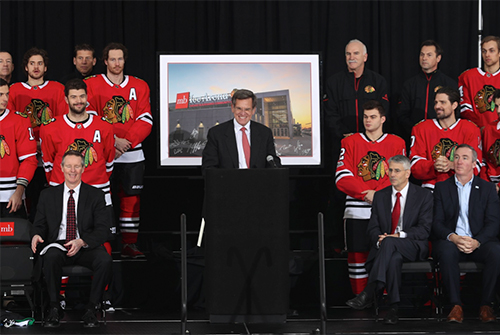
“We are currently running several programs at the MB Ice Arena. ‘Building Champions’ is an after-school program that teaches social and emotional learning through sports.
“’First Stride’ takes students to our team’s training facility for 40 minutes on ice and 40 minutes of STEM classroom education. We provide free transportation, healthy snacks, socks for skating, and more. We work with Chicago Public Schools to select schools from wards across the city.
“We also collaborate with the McCormick Foundation, which matches 50 cents to our dollar.”
“By the way,” Wirtz leans in with a smile, “for a $50 donation to the foundation, I give an autographed copy of ‘The Breakaway’ to the donor too.”
One last question before we adjourn to his office for that autograph opportunity. It’s one that must occur to many other readers of this book too. Why? Why did this man who is clearly so proud of his family and heritage collaborate on this candid book that also points out so much that is unflattering?
“A lot of people forgot that Arthur started this. They only remember Bill. [Derisively nicknamed “Dollar Bill” because of his Blackhawks mismanagement.]
“Arthur started with nothing. He was truly up by his bootstraps. Arthur and Virginia worked as a true team too. She was involved in boards that were important. They worked together as a couple.”
“My dad, Bill, was smart. But Arthur was smart and clever. Dad was tough. Arthur was tougher. I learned that if you could stand up to my grandfather, you could do anything.”
Somehow Wirtz managed to not only stand up to, but also emulate with humility the best of both generations. He may be as tough as his grandfather, but he doesn’t act it. Instead he’s a true gentleman who sees the best in others, is proud of his heritage. He hopes that the rest of his family understands this too.
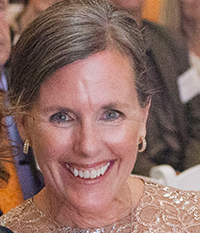 Susan B. Noyes is the Founder & Chief Visionary Officer of Make It Better Media Group, as well as the Founder of Make It Better Foundation’s Philanthropy Awards. A mother of six, former Sidley Austin labor lawyer and U.S. Congressional Aide, passionate philanthropist, and intuitive connector, she has served on boards for the Poetry Foundation, Harvard University Graduate School of Education Visiting Committee, American Red Cross, Lurie Children’s Hospital, Annenberg Challenge, Chicago Public Education Fund, Lyric Opera of Chicago, Chicago Symphony Orchestra, New Trier High School District 203, and her beloved Kenilworth Union Church. But most of all, she enjoys writing and serving others by creating virtuous circles that amplify social impact.
Susan B. Noyes is the Founder & Chief Visionary Officer of Make It Better Media Group, as well as the Founder of Make It Better Foundation’s Philanthropy Awards. A mother of six, former Sidley Austin labor lawyer and U.S. Congressional Aide, passionate philanthropist, and intuitive connector, she has served on boards for the Poetry Foundation, Harvard University Graduate School of Education Visiting Committee, American Red Cross, Lurie Children’s Hospital, Annenberg Challenge, Chicago Public Education Fund, Lyric Opera of Chicago, Chicago Symphony Orchestra, New Trier High School District 203, and her beloved Kenilworth Union Church. But most of all, she enjoys writing and serving others by creating virtuous circles that amplify social impact.
